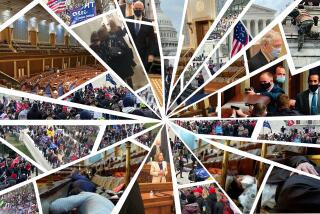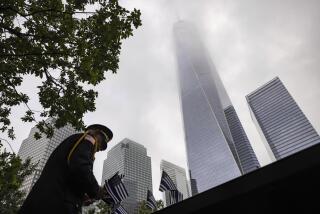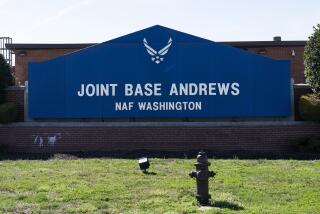In Crippled Capital, a Dazed Sense of Unreality
- Share via
WASHINGTON — The nation’s capital was crippled Tuesday, its offices evacuated, its military nerve center in flames, its streets deserted and many of its leaders left to wander outside an emptied Capitol with no master plan and no marching orders.
In a place where power and control are the most important currency, it felt for several hours as though no one was in charge as a spate of terrorist attacks caught Washington flat-footed and transformed it from bustling bureaucracy to ghost town.
Lawmakers near the seat of power were no more prepared than the local postal worker, left to figure out how to get home as the terrorism that began at 8:45 a.m. in New York City spread to the Pentagon. Thousands of workers and tourists trapped in the District of Columbia by barricades and gridlock marched home with urgent efficiency and striking calm as helicopters cut the skies and sirens wailed.
Members of Congress waited, helpless, in a park across from the Senate office buildings, huddled under trees and around crackling portable radios, which reported that the roof of the Pentagon had just caved in. Sen. Joseph R. Biden Jr. (D-Del.) was turned back from taking to the Senate floor, where he intended to make a speech “just so people could see us.” He was spotted later on a park bench with a cell phone to his ear.
The bizarre day unfolded beneath a sparkling, autumn-like sky, an early reprieve from a muggy summer. Word first spread of the World Trade Center assault, and Washington cringed. But an hour later the attack hit home, when American Airlines Flight 77 bound from Dulles International Airport to Los Angeles plowed into the Pentagon and burst into flames.
People with stricken faces punched anxiously at useless cell phones as they poured out of the Supreme Court, the Treasury Building, the departments of Transportation, Commerce, Energy and State.
“I guess this is Armageddon,” said Joel Thomas, who works on ground systems at the Federal Aviation Administration. “It’s unlike anything I’ve ever experienced. It’s war, that’s what it is.”
First Lady Laura Bush, who was at the Capitol to testify before a committee, was hustled back to the White House, and congressional leaders were whisked to a secure location.
Some people walked as many as eight miles home as fighter jets circled the skies, setting off a sonic boom that jittery bystanders mistook for a bomb. Hot dog stands stood abandoned.
Outside the Pentagon, the parking lot was a mob scene.
Back across the Potomac, Sen. John W. Warner (R-Va.) led his staff in an impromptu prayer session minutes before police trotted down the halls of his office building commanding members to “Get out!”
“I never thought after 23 years in the Senate I would be standing our here like this,” Warner said, appearing dazed as he likened the disaster to the attack on Pearl Harbor.
Shaken leaders struggled to absorb the magnitude of the assault, milling around police headquarters, which served as a makeshift Congress. From office workers to senators, people worried that the government lacked a plan for such large-scale disaster.
“It was total confusion,” said Becky Wietz, an Interior Department employee. “So many people were trying to call out that the phones wouldn’t work.”
The most classified government functions were hobbled as the State Department emptied. Even the department’s operations center, the communications hub responsible for international crises, was largely cleared out.
Two of the department’s top intelligence officials sat in a park trying to figure out where they could work for the rest of the day. Officials swapped stories about the difficulty they had closing down their classified computers or throwing documents into office safes in the minutes before evacuating.
Lawmakers were unnerved by the display of vulnerability.
“This has been extremely chaotic,” said Rep. Mark Foley (R-Fla.). “We weren’t prepared for this. We don’t have an action plan.”
All over the city, there was talk that Washington would never be the same, that the center of American power had buckled at the knees, its Congress paralyzed, its president locked out of the White House, the stuff of Tom Clancy fiction.
“Sometimes when you’re the superpower, you think you don’t have to worry. Some days you’re wrong,” said an ashen Christopher Grady, 23, director of Voter Outreach at the Christian Coalition, who stood at a pay phone, hands shaking, after watching the Pentagon erupt in flames.
“My mom works at the Pentagon, my mom works at the Pentagon,” one man repeated desperately, rocking back and forth, urging the line at the pay phone to move.
At Dulles, crowds formed at baggage terminals as passengers booked on canceled flights searched for lodging or a way home. One woman tried 19 hotels with no luck.
The exodus was carried out with a veneer of calm that masked swelling fear and rage.
“It’s an act of war,” said Jim Ellenberger, 55, a union official who was prevented by a police line from returning to his office across from the Treasury Building.
“I’m angry, I’m very seriously angry,” said Kitenge N’Gambwa, carrying on his shoulders a 4-year-old son evacuated from his preschool. “It has to have taken a terrible amount of hatred for anyone to do the things that were done today.”
By early afternoon, an eerie calm had fallen over a nearly empty city. Except for a few shutterbugs, there was no one at the Vietnam Veterans Memorial, the Lincoln Memorial, the Reflecting Pool. A plume of smoke spiraled behind the Washington Monument for what seemed like a long time.
Times staff writers Megan Garvey, Matea Gold, Janet Hook, Jim Mann, Alan Miller, Elizabeth Shogren and researcher Robert Patrick contributed to this report.
More to Read
Sign up for Essential California
The most important California stories and recommendations in your inbox every morning.
You may occasionally receive promotional content from the Los Angeles Times.













